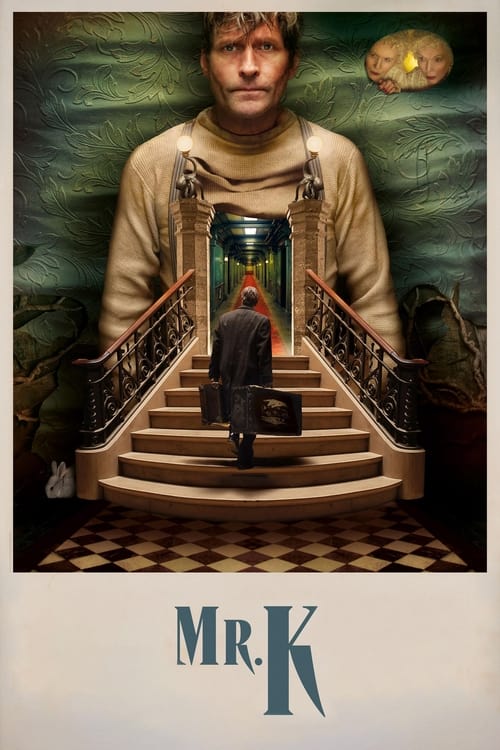Mr. K

Plot
Mr. K, a skilled and charismatic magician, is accustomed to the world of spectacle and illusion. His travels around the globe have taken him to various performances, from grand theaters to intimate clubs, mesmerizing audiences with his tricks and sleights of hand. However, on this particular morning, his expertise in deception is put to the test as he finds himself trapped in a labyrinthine hotel, caught in a surreal and oppressive world that defies the laws of reality. Upon waking, Mr. K steps out of his bed and begins his routine search for the exit. Walking through the doorway, he expects to see the familiar corridors and signs of the hotel lobby. Instead, he discovers himself in a short, dimly lit corridor with a single door at the far end, which appears to lead back to the room he has just left. Disoriented and slightly perplexed, Mr. K approaches the door, turns the handle, and opens it, intending to exit. However, upon stepping back into the main corridor, he finds himself at a familiar-looking point, only to be confronted with the same door at the end of the corridor, which gives access to his bedroom. This initial failure sets off a chain reaction, trapping Mr. K in an infinite loop of corridors, rooms, and doors. Every attempt to find a way out results in him being redirected back to previous locations or encountering similar-looking spaces that tantalizingly evoke a sense of familiarity. His confusion deepens, as does his sense of claustrophobia. It's as if the hotel itself has become a living, breathing entity, playing tricks on him with an almost sadistic intent. As the days pass, Mr. K struggles to maintain a semblance of order. He loses track of time, and his sense of identity begins to disintegrate. His connection to the outside world is tenuous at best. What little communication he receives is vague and offers no concrete information about his predicament. On several occasions, he sees strangers apparently conversing with him, only to realize they are mere phantoms created by the hotel, feeding off his mental exhaustion. Throughout his ordeal, Mr. K undergoes a psychological transformation, from a confident conjurer to a broken, isolated individual. His magic skills, once the foundation of his confidence, become increasingly unreliable as the environment seems to defy even the basic rules of reality. He resorts to using his tricks to cope with the hotel's manipulation of his perceptions, often performing sleight of hand on himself in futile attempts to create order. The hotel, this labyrinthine prison, exhibits a seemingly sentient quality, evolving and adapting to Mr. K's actions. Spaces that once seemed familiar gradually change or disappear, forcing him to navigate an ever-shifting landscape. Conversations with non-existent individuals, messages scrawled on walls, and cryptic instructions typed on chalkboards provide him with meager information and only add to the growing sense of futility. It is in one of these seemingly abandoned areas where Mr. K encounters a cast of characters that further ensnare him in the hotel's mysterious world. Among these inhabitants is a mysterious woman, with whom he shares bittersweet and abstract conversations, trying to grasp the nature of reality. As their conversations unfold, it becomes increasingly difficult to distinguish between reality and fiction, between the hotel's tricks and Mr. K's own deranged thoughts. The blurred boundaries between Mr. K's understanding of the world and the fluid, dreamlike world of the hotel produce an effect that blurs the line between the mystical and the terrifying. Their relationship adds depth and emotion to the monotonous exercise in paranoia, allowing Mr. K to experience human connection even as he feels increasingly disconnected from his own sanity. As the indefinite period of time elapses, Mr. K's perception of time dissolves. With his physical, mental, and emotional resources exhausted, the magician is forced to accept the cruel realization that he will never leave the hotel. It is in this final, sorrowful acceptance that the cyclical nature of the hotel's traps becomes apparent: Mr. K realizes that he has, in fact, been here before, trapped in this same paradoxical labyrinth, playing out an eternal, futile dance. This existential realization threatens to break Mr. K, eradicating the last shreds of his sanity and identity. However, the remnants of his once-unsurpassed magician's wit, barely clinging to his last glimpses of individuality, present a final intervention. It is through the exercise of one final trick of the mind that we see Mr. K disintegrate into nothingness, leaving behind only the faint, disconnected echoes of his once-vibrant existence. Mr. K's torment shows no signs of waning; it is in this selfsame darkness, now extinguished from the world of the living, that he perpetuates an endless cycle, shackled by the unforgiving hotel's infinite corridors and room after room of monotonous deceit.
Reviews
Recommendations




